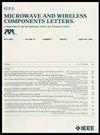使用叠加双频带配置和DGS电感器的44.4%FBW的高PAE CMOS功率放大器
IF 3.3
2区 工程技术
Q2 ENGINEERING, ELECTRICAL & ELECTRONIC
引用次数: 4
摘要
介绍了一种采用交错叠加技术和缺陷接地结构(DGS)电感的两级180纳米CMOS宽带(14-22 GHz)功率放大器(PA),其中在中心频率处设计了宽带峰值主级;然后,提出了一个叠加双频(SDB)驱动级,以获得全带宽(BW)的最佳平坦增益响应。此外,DGS电感通过降低匹配电路的插入损耗来提高功率附加效率(PAE)。所提出的放大器在总芯片面积为0.564 mm2的情况下实现了12 dB的功率增益。此外,在中心频率处,它实现了16.6 dBm的饱和输出功率,表现出最小的幅相失真(2.1°)和群延迟(±66 ps)变化。最后,它给出了迄今为止最高的分数带宽(FBW)(44.4%)和PAE(18.7%)。此外,对于400-MHz 5G-NR信号,在9.3 dbm输出功率下,它的误差矢量幅度为- 25 dB。本文章由计算机程序翻译,如有差异,请以英文原文为准。
High PAE CMOS Power Amplifier With 44.4% FBW Using Superimposed Dual-Band Configuration and DGS Inductors
A two-stage 180-nm CMOS wideband (14–22 GHz) power amplifier (PA) with a superimposed staggered technique and defected-ground-structure (DGS) inductors is introduced, where a wideband peaking main stage is designed at the center frequency; then, a superimposed dual-band (SDB) driver stage is proposed to obtain the optimally flat gain response over the whole bandwidth (BW). Also, DGS inductors are used to enhance the power added efficiency (PAE) of the implemented PA by decreasing the matching circuits’ insertion losses. The proposed PA achieved a power gain of 12 dB at a total chip area of 0.564 mm2. Also, at the center frequency, it achieved a saturated output power of 16.6 dBm exhibiting the smallest reported amplitude-to-phase (AM-PM) distortion (2.1°) and group delay (GD) variations (±66 ps). Finally, it gives among the highest fractional bandwidth (FBW) (44.4%) and the PAE (18.7%) so far. Also, it achieves an error vector magnitude of −25 dB at 9.3-dBm output power for a 400-MHz 5G-NR signal.
求助全文
通过发布文献求助,成功后即可免费获取论文全文。
去求助
来源期刊

IEEE Microwave and Wireless Components Letters
工程技术-工程:电子与电气
自引率
13.30%
发文量
376
审稿时长
3.0 months
期刊介绍:
The IEEE Microwave and Wireless Components Letters (MWCL) publishes four-page papers (3 pages of text + up to 1 page of references) that focus on microwave theory, techniques and applications as they relate to components, devices, circuits, biological effects, and systems involving the generation, modulation, demodulation, control, transmission, and detection of microwave signals. This includes scientific, technical, medical and industrial activities. Microwave theory and techniques relates to electromagnetic waves in the frequency range of a few MHz and a THz; other spectral regions and wave types are included within the scope of the MWCL whenever basic microwave theory and techniques can yield useful results. Generally, this occurs in the theory of wave propagation in structures with dimensions comparable to a wavelength, and in the related techniques for analysis and design.
 求助内容:
求助内容: 应助结果提醒方式:
应助结果提醒方式:


